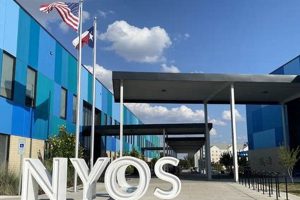High-quality vocational institutions in the Commonwealth offer specialized training programs designed to prepare individuals for skilled trades and careers. These programs often emphasize practical, hands-on learning and can lead to industry-recognized certifications or associate degrees. Examples include welding, automotive technology, culinary arts, and healthcare fields like practical nursing.
Skilled trades are crucial for Virginia’s economic growth and infrastructure development. A robust workforce trained in these areas addresses critical workforce demands, contributes to a thriving economy, and offers individuals fulfilling career paths with competitive wages. Historically, vocational training has played a significant role in Virginia’s development, supporting industries from shipbuilding to agriculture. Today, these institutions continue to evolve, adapting their programs to meet the needs of a changing technological landscape and emerging industries.
This article will explore various aspects of vocational education in Virginia, covering program options, admission requirements, financial aid opportunities, and career prospects. Furthermore, it will delve into specific institutions known for their excellence in trade education and provide resources for prospective students seeking to enter these rewarding fields.
Tips for Selecting a Vocational Program
Choosing the right vocational program is a crucial step toward a successful career. Careful consideration of individual goals, program quality, and available resources is essential.
Tip 1: Research Program Accreditation: Ensure the institution holds accreditation from recognized organizations. Accreditation signifies adherence to quality standards and often facilitates transfer of credits if desired.
Tip 2: Align Programs with Career Goals: Evaluate personal interests and career aspirations. Select a program that provides the necessary skills and knowledge for the desired profession.
Tip 3: Consider Program Length and Format: Programs vary in duration and delivery methods. Choose a program that fits individual schedules and learning preferences, whether full-time, part-time, or online.
Tip 4: Evaluate Facilities and Equipment: Modern facilities and up-to-date equipment are essential for effective hands-on training. Tour potential schools and examine their workshops and labs.
Tip 5: Investigate Job Placement Rates: High job placement rates often indicate a program’s effectiveness in preparing students for employment. Inquire about alumni success and employer connections.
Tip 6: Explore Financial Aid Options: Vocational training can be costly. Research available grants, scholarships, and loan programs to minimize financial burden.
Tip 7: Connect with Current Students or Alumni: Gain valuable insights into program quality and student experiences by speaking with current students or alumni.
By considering these tips, prospective students can make informed decisions and choose vocational programs that align with their career goals and enhance their potential for success.
This information provides a foundation for selecting a high-quality vocational program. The following sections will further explore specific institutions and resources within Virginia.
1. Program Quality
Program quality serves as a cornerstone of high-ranking vocational institutions in Virginia. Superior programs exhibit several key characteristics: a curriculum aligned with current industry standards, experienced instructors with relevant field expertise, and ample opportunities for hands-on, practical training. These elements ensure graduates possess the skills and knowledge required for successful entry into the workforce. For example, a machining program utilizing state-of-the-art CNC equipment and taught by instructors with extensive industry experience provides students with a significant advantage in the job market. Conversely, outdated equipment or a curriculum lagging behind industry advancements can hinder graduate success.
The impact of program quality extends beyond immediate job placement. Well-designed programs foster critical thinking skills, problem-solving abilities, and adaptability crucial attributes in today’s rapidly evolving technological landscape. These skills empower graduates to not only secure initial employment but also advance within their chosen fields and navigate career transitions effectively. Furthermore, high-quality programs often cultivate a culture of continuous learning, encouraging graduates to pursue further education and professional development throughout their careers. This commitment to lifelong learning contributes significantly to long-term career success and overall job satisfaction.
In summary, program quality is a pivotal factor in determining the effectiveness and reputation of vocational institutions. Institutions prioritizing curriculum relevance, instructor expertise, and hands-on training equip graduates with the skills and adaptability necessary for thriving careers. This emphasis on quality ultimately benefits both individual graduates and the broader Virginia economy by contributing to a skilled and competitive workforce.
2. Industry Connections
Strong industry connections are a hallmark of leading vocational institutions in Virginia. These partnerships play a crucial role in bridging the gap between education and employment, ensuring programs remain aligned with current workforce demands and providing students with invaluable real-world experience.
- Internships and Apprenticeships
Partnerships with local businesses create opportunities for students to gain practical experience through internships and apprenticeships. These experiences provide exposure to real-world work environments, allow students to apply classroom knowledge, and develop essential workplace skills. For example, an electrical technology student might intern with a contracting firm, gaining hands-on experience in wiring installations and building code compliance.
- Advisory Boards
Industry professionals often serve on advisory boards, providing guidance on curriculum development and ensuring program relevance. This direct input keeps programs aligned with evolving industry needs and technological advancements. For instance, an advisory board for a cybersecurity program might include experts from IT companies and government agencies, informing curriculum updates to address emerging cyber threats.
- Job Placement Assistance
Institutions with strong industry ties often have dedicated career services departments that assist students with job placement. These departments cultivate relationships with employers, organize career fairs, and provide resume writing and interview preparation support. This assistance streamlines the job search process and increases graduates’ chances of securing employment in their chosen fields.
- Equipment and Technology
Industry partnerships can lead to donations or discounted access to state-of-the-art equipment and technology. This access ensures students train on industry-standard tools and software, enhancing their skill sets and making them more competitive candidates upon graduation. A partnership with a software company, for instance, might provide students with access to specialized design software used in architectural drafting.
These robust industry connections enhance the educational experience and contribute significantly to the success of vocational school graduates in Virginia. By providing access to practical experience, industry-relevant curriculum, and job placement support, these partnerships create a pathway for students to seamlessly transition into fulfilling and rewarding careers.
3. Student Support
Comprehensive student support services are integral to high-quality vocational education in Virginia. These services play a critical role in student success, addressing academic, personal, and career development needs. Robust support systems contribute significantly to higher graduation rates, improved job placement outcomes, and increased overall student satisfaction. Effective student support encompasses a range of services tailored to the unique challenges faced by vocational students. These may include academic advising, tutoring, financial aid guidance, career counseling, and access to disability services. For example, a student struggling with a specific welding technique might benefit from personalized tutoring sessions, while another might require assistance navigating the financial aid application process. These targeted interventions help students overcome obstacles and reach their full potential.
The practical significance of robust student support is evident in its impact on student outcomes. Students who receive adequate support are more likely to persist in their programs, graduate on time, and secure employment in their chosen fields. Furthermore, effective support systems can foster a sense of community and belonging, creating a more positive and engaging learning environment. This sense of belonging is particularly important for students transitioning into a new field or facing personal challenges. For instance, a single parent enrolled in a culinary arts program might benefit from childcare services or flexible scheduling options, enabling them to balance family responsibilities with educational pursuits. The availability of such support services can be a deciding factor in whether a student succeeds or struggles.
In conclusion, comprehensive student support is an essential component of successful vocational institutions in Virginia. By addressing the diverse needs of students, these services contribute significantly to positive educational outcomes and enhance the overall learning experience. Institutions that prioritize student support demonstrate a commitment to student success and contribute to a well-trained and prepared workforce in the Commonwealth. The availability and effectiveness of these services are key factors to consider when evaluating vocational training options. Addressing potential gaps in support services or advocating for increased resources in this area can further enhance the quality of vocational education and improve outcomes for students across Virginia.
4. Career Outcomes
Successful career outcomes are a defining characteristic of high-quality vocational institutions in Virginia. These outcomes, often measured by job placement rates, salary levels, and career advancement opportunities, directly reflect the effectiveness of the training provided. A strong correlation exists between positive career outcomes and institutions that prioritize industry-relevant curriculum, hands-on training, and robust career services. For example, graduates of a well-regarded welding program with high job placement rates in reputable firms likely benefited from comprehensive training aligned with industry needs and employer expectations. Conversely, low placement rates or graduates struggling to find employment in their chosen fields might indicate program deficiencies. Analyzing career outcomes provides valuable insights into the strengths and weaknesses of various vocational programs.
The practical significance of examining career outcomes is substantial for prospective students. Understanding typical career paths, average salaries, and job market demand associated with specific programs allows individuals to make informed decisions about their educational investments. Researching alumni success stories and employment trends within specific trades empowers prospective students to choose programs aligned with their career aspirations and financial goals. Furthermore, understanding career outcomes helps individuals assess the return on investment of vocational training, comparing program costs with potential earnings. For instance, a prospective student considering a plumbing program might research average plumber salaries in their region and compare them to tuition costs and estimated loan repayments to evaluate the long-term financial viability of pursuing that career path.
In summary, career outcomes serve as a crucial metric for evaluating the effectiveness of vocational training programs. Analyzing placement rates, salary data, and career progression trends provides valuable insights for prospective students and helps identify high-performing institutions. This data-driven approach empowers individuals to make informed decisions, aligning educational choices with career aspirations and maximizing the potential for long-term career success in Virginia’s dynamic workforce.
5. Accreditation
Accreditation plays a pivotal role in defining the best trade schools in Virginia. It serves as a crucial indicator of quality and credibility, signifying that an institution meets rigorous standards established by recognized accrediting bodies. These standards encompass various aspects of educational quality, including curriculum, faculty qualifications, facilities, and student support services. The presence of accreditation provides assurance to prospective students, employers, and the public that a vocational school adheres to established best practices and delivers a high-caliber education. For instance, accreditation by the Accrediting Commission of Career Schools and Colleges (ACCSC) signifies that a Virginia trade school meets nationally recognized standards for vocational education. This accreditation enhances the reputation of the institution and strengthens the value of its credentials in the job market.
The practical significance of accreditation extends beyond reputational benefits. Graduates of accredited institutions often experience enhanced career prospects. Employers frequently prefer candidates with credentials from accredited schools, recognizing the value of standardized, high-quality training. Accreditation can also facilitate access to financial aid opportunities, as some federal and state aid programs require attendance at an accredited institution. Furthermore, credits earned at accredited institutions may be more readily transferable to other educational programs, providing flexibility for students pursuing further education. For example, a student completing an accredited welding program might be able to transfer some credits towards an associate degree in a related field at a community college. This seamless transferability expands educational pathways and career advancement opportunities.
In summary, accreditation is a cornerstone of quality in vocational education and a key factor in identifying the best trade schools in Virginia. It provides a framework for evaluating institutional effectiveness and signifies adherence to rigorous standards. Choosing an accredited institution strengthens career prospects, enhances access to financial aid, and provides flexibility for future educational pursuits. Understanding the significance of accreditation empowers prospective students to make informed decisions, selecting programs that offer high-quality training and contribute to long-term career success. While accreditation offers valuable assurances, ongoing research into specific program outcomes and industry alignment remains crucial for informed decision-making.
Frequently Asked Questions
This section addresses common inquiries regarding vocational education in Virginia, providing concise and informative responses to assist prospective students in their decision-making process.
Question 1: How does one determine program quality?
Indicators of program quality include accreditation, industry-recognized certifications, experienced instructors, modern equipment, and high job placement rates. Thorough research, including contacting current students and alumni, is recommended.
Question 2: What financial aid options are available?
Financial aid options include federal grants, state grants, scholarships, and student loans. Eligibility requirements vary. Contacting the financial aid office of the chosen institution is advised.
Question 3: How long do most programs take to complete?
Program length varies depending on the specific trade and credential sought. Programs can range from several months to two years. Certificate programs are generally shorter than associate degree programs.
Question 4: What are the admission requirements?
Admission requirements typically include a high school diploma or GED equivalent. Some programs may require specific prerequisite courses or entrance exams. Checking with individual institutions is crucial.
Question 5: Are online vocational programs available?
Online programs are becoming increasingly common, offering flexibility for students. However, many trades require hands-on training, limiting the availability of fully online options. Hybrid programs combining online and in-person instruction are often available.
Question 6: What are the long-term career prospects?
Career prospects for skilled trades are generally positive, with consistent demand for qualified professionals. Opportunities for career advancement and specialization exist within many trades. Continuous professional development is crucial for remaining competitive in the evolving job market.
Thorough research and careful consideration of individual circumstances are essential for making informed decisions about vocational education. Consulting with career counselors and representatives from prospective institutions is highly recommended.
The following section will explore specific resources available to prospective students in Virginia.
Conclusion
High-quality vocational training institutions within the Commonwealth offer diverse pathways to rewarding careers. Factors such as program quality, industry connections, student support, career outcomes, and accreditation are critical indicators of institutional excellence. Careful consideration of these factors empowers prospective students to make informed decisions aligned with individual career aspirations and the evolving demands of the Virginia workforce. This exploration has highlighted the significance of rigorous training programs, strong industry partnerships, and comprehensive student support in preparing individuals for successful careers in skilled trades.
Virginia’s economic future hinges on a skilled and adaptable workforce. Investing in high-quality vocational education is essential for meeting workforce demands, driving economic growth, and fostering individual prosperity. The pursuit of excellence in trade education remains crucial for ensuring a thriving economy and a bright future for the Commonwealth. Further exploration of specific programs, institutions, and career pathways is encouraged for individuals seeking to contribute to Virginia’s continued success.







